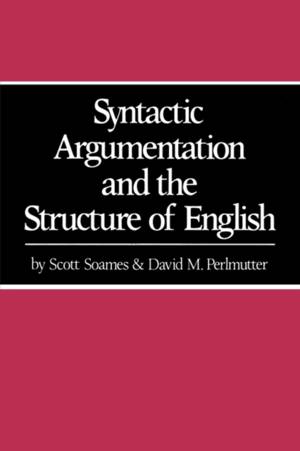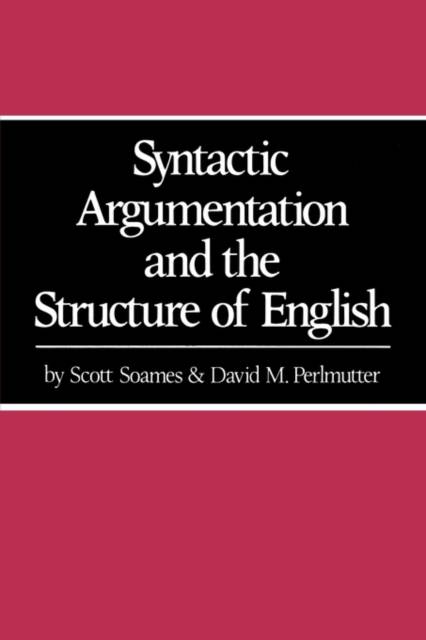
- Retrait gratuit dans votre magasin Club
- 7.000.000 titres dans notre catalogue
- Payer en toute sécurité
- Toujours un magasin près de chez vous
- Retrait gratuit dans votre magasin Club
- 7.000.0000 titres dans notre catalogue
- Payer en toute sécurité
- Toujours un magasin près de chez vous
Syntactic Argumentation and the Structure of English
Scott Soames, David M Perlmutter
Livre broché | Anglais
67,95 €
+ 135 points
Description
Syntactic Argumentation and the Structure of English (SASE) presents the major theoretical developments in generative syntax and the empirical arguments motivating them. Beautifully and lucidly written, it is an invaluable resource for working linguists as well as a pedagogical tool of unequaled depth and breadth. The chief focus of the book is syntactic argumentation. Beginning with the fundamentals of generative syntax, it proceeds by a series of gradually unfolding arguments to analyses of some of the most sophisticated proposals. It includes a wide variety of problems that guide the reader in constructing arguments deciding between alternative analyses of syntactic constructions and alternative theoretical formulations. Someone who has worked through the problems and arguments in this book will be able to apply the skills in argumentation it develops to novel issues in syntax. While teaching syntactic argumentation, SASE covers the major empirical results of generative syntax. Its contents include: 1) Transformations in single-clause sentences2) Complementation and multi-clause transformations3) Universal principles governing rule interaction: the cycle and strict cyclicity4) Movement rules5) Ross's constraints6) Pronominal reference and anaphora SASE is an important book for several different audiences: 1) For students, it is an introduction to syntax that teaches argumentation as well as a wide range of empirical results in the field. 2) For linguists, it is a sourcebook of classical analyses and arguments, with some new arguments bearing on classical issues. 3) For scholars, teachers, and students in related fields, it is a comprehensive guide to the major empirical and theoretical developments in generative syntax. SASE contains enough material for a two-semester or three-quarler sequence in syntax. Because it assumes no previous background, it can be used as the main text in an introduction to syntax. Since it covers a wide range of material not available in other texts, it is also suitable for intermediate and advanced syntax courses and as a supplementary source in more specialized courses and courses in other disciplines. A storehouse of classical and original arguments, SASE will prove to be of lasting value to the teacher, the student, and researchers in both linguistics and related fields.
Spécifications
Parties prenantes
- Auteur(s) :
- Editeur:
Contenu
- Nombre de pages :
- 618
- Langue:
- Anglais
Caractéristiques
- EAN:
- 9780520038332
- Date de parution :
- 25-07-79
- Format:
- Livre broché
- Format numérique:
- Trade paperback (VS)
- Dimensions :
- 152 mm x 228 mm
- Poids :
- 820 g

Les avis
Nous publions uniquement les avis qui respectent les conditions requises. Consultez nos conditions pour les avis.






